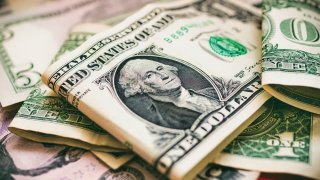The Federal Reserve’s Inflation Nightmare Won’t Go Away
Unfortunately for the Fed, it will have to conduct monetary policy without a clear answer to the inflation question. It will have to hope that the monetarists are proven wrong and that it would not have endangered the economy by keeping interest rates too high and ignoring money supply developments.
When Henry Kissinger asked for his opinion about the influence of the French Revolution, Chinese premier Zhou Enlai purportedly replied that two hundred years on it was “too early to tell.” Something similar might be said about today’s key economic question. Was 2022’s burst of inflation to over 9 percent due to transitory factors like the Covid-19 pandemic and Russia’s invasion of Ukraine? Or was it primarily due to the excessively expansive stance of budget and monetary policy?
The answer to the inflation question has considerable policy implications for the Federal Reserve.
If the burst in inflation was due to transitory factors, maybe the Fed did not need to slam on the monetary policy brakes as hard as it did last year to regain inflation control. Inflation would have slowed as the temporary supply disruptions wore off. If, on the other hand, 2022’s inflation was due to the Fed keeping interest rates too low for too long and allowing the money supply to balloon, maybe then the Fed’s current insistence on keeping interest rates high and allowing the money supply to contract will precipitate a recession and risk a bout of deflation.
Those arguing that 2022’s inflation was a transitory phenomenon can point to the supply chain disruptions caused by the COVID-19 pandemic and the spike in food and energy prices that occurred due to Russia’s war with Ukraine. They would note that a large part of inflation’s acceleration was due to gasoline prices increasing to well over $4 per gallon and to used car prices going through the roof as a result of disruptions to the automobile supply chain.
They would argue that inflation’s downward movement last year towards the Fed’s 2 percent inflation target was largely the result of supply chain repairs and international oil price decreases as the result of a slowing world economy. According to this view, the Fed was not responsible for 2022’s inflation surge, and the Fed should not now be taking undue credit for inflation’s recent sharp deceleration. They would also note that inflation is coming down even though unemployment remains close to its all-time post-war low.
The alternative view of inflation’s recent gyrations takes Milton Friedman’s famous dictum as its starting point: inflation is always and everywhere a monetary phenomenon. According to this view, 2022’s inflation surge should have come as no surprise given the 40 percent cumulative increase in the broad money supply between the beginning of 2020 and the end of 2021. That unprecedented money supply burst directly resulted from the Fed keeping interest rates too low for too long and expanding its balance sheet by over $4 trillion to finance the government’s substantial Covid-related budget deficits.
According to this inflation view, the Fed is now risking both sending the economy into recession and inviting a bout of deflation. It is doing so partly by keeping inflation-adjusted interest rates too high in the context of a slowing economy. More importantly, it is doing so by allowing the broad money supply to contract for the first time since the Fed started publishing these numbers in 1959.
Fortunately, unlike Zhou Enlai, we will not need to wait two hundred years to get an answer to our inflation question. Rather, we should have an answer by the end of this year. By then, we will know whether or not the economy experienced a meaningful recession and whether or not the deflation worries resurface. If we do experience meaningful deflation, the monetarists will be entitled to take a victory lap. If, on the other hand, we get a soft economic landing, those in the transitory inflation camp will be vindicated.
Unfortunately for the Fed, it will have to conduct monetary policy without a clear answer to the inflation question. It will have to hope that the monetarists are proven wrong and that it would not have endangered the economy by keeping interest rates too high and ignoring money supply developments.
Desmond Lachman is a senior fellow at the American Enterprise Institute. He was a deputy director in the International Monetary Fund’s Policy Development and Review Department and the chief emerging-market economic strategist at Salomon Smith Barney.
Image: Shutterstock.

